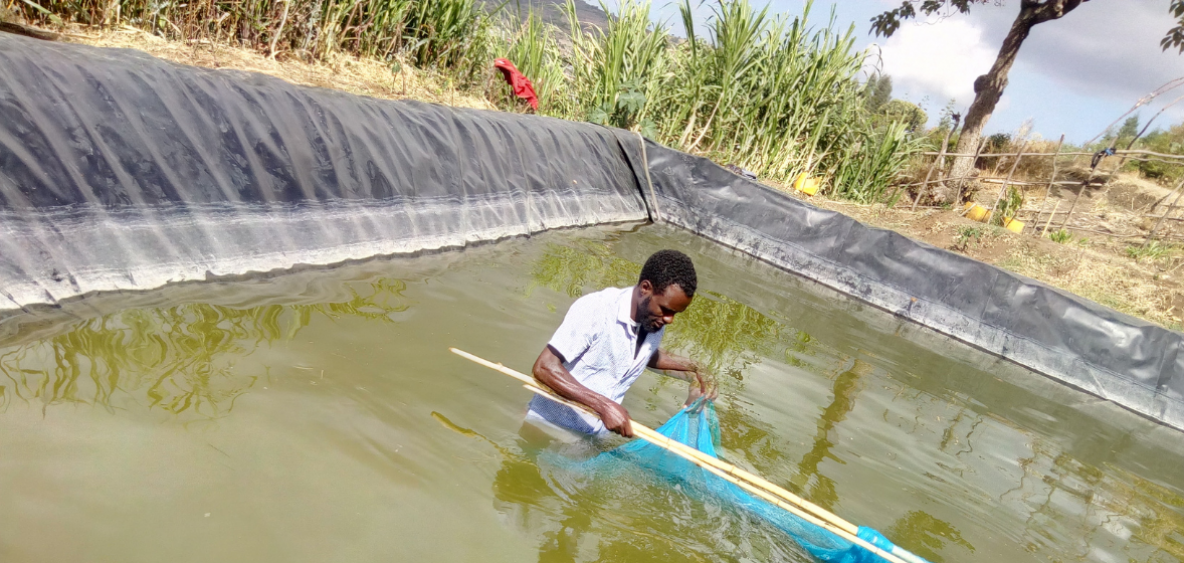 Aliyi Mohammed’s fish pond provides nutrition for his household and a reliable water source, all year round.
Credit: Chali Keneni, Project Coordinator for Doba District, Ethiopia
Aliyi Mohammed’s fish pond provides nutrition for his household and a reliable water source, all year round.
Credit: Chali Keneni, Project Coordinator for Doba District, Ethiopia
A small-scale farmer is making the most of a small plot of land and some big dreams. With help from the RFS Ethiopia project, Aliyi Mohammed has diversified his agricultural production to feed his family, fuel his ambitions and encourage him to look into the future.
Traditionally, when we think of successful agricultural systems, we’re often thinking of expansive fields with a sea of crops basking in the sun. But the reality is that not everyone has access to a lot of land, which makes meeting ends-meet a challenge for many smallholder farmers.
But farmers don’t need big plots for big dreams, making diversified production systems and multiple land-uses a small-scale producer’s best friend. The challenge? Technical know-how and access to start-up materials.
Fortunately, many farmers are nowhere short of the will to find a way – like Aliyi Mohammed, RFS Ethiopia project beneficiary in Doba district, whose determination and creativity serve as a model for what farmers can accomplish with limited space.
Aliyi, a young father of three, used to make his living off of sorghum production on a small plot of less than a quarter hectare. Degraded soils, high slopes and a short rainfall period meant that cultivation was extremely difficult and returns meager. With two elderly dependents, his children and his wife to support, Aliyi was only able to earn enough income to support the family for three months of the year through agriculture.
“I used to wander here and there looking for something to do and even going to sleep without doing anything while waiting for monthly food aid,” remembers Aliyi, who would take on day-labour work for neighbouring businesses – when it was available.
Unfortunately, food and labour insecurity are common in Aliyi’s community. But hope was on the horizon.
When a friend mentioned the emerging extension projects, Aliyi went straight to his local administration office to register.
The RFS Ethiopia project, Integrated Landscape Management to Enhance Food Security and Ecosystem Resilience, is implemented by UNDP and the Environmental Protection Authority (EPA) of Ethiopia and offers livelihood interventions and support to low-income households. Through the program, Aliyi has been able to transform his smallholding into a productive and lucrative system, and he is sharing his experiences with others as a model project beneficiary. His farm now serves as a centre of learning for twenty neighbouring farmers who come to him to learn practical skills.

A major part of Aliyi’s success has been his sheer motivation and enthusiasm for engaging with project activities. He took part in several training sessions, learning as many new skills as possible and applying them in creative ways on his farm.
Aliyi started off by producing vegetables with improved seeds and technical support from his local project office on his small plot of land during the rainy season. Then, with help and encouragement from his local extension team, Aliyi constructed a pond so he could irrigate and harvest vegetables all year. His pond can store about 10,000m3 of surface runoff.
Lined with a geomembrane and surrounded with fodder plants that both feed his animals and create an ideal microclimate by reducing evaporation, Aliyi’s pond also plays an integral role in his household’s food supply. The pond is home to a school of fish that was provided by the RFS team that diversifies the family’s nutritional input. The project also provided 15 hens who eat farm residue and whose droppings in turn feed Aliyi’s school of fish. Waste not!
But that’s not all. Aliyi has also built a bio-gas pit where he stores crop residue and cow dung to make fuel and fertilizer, and he even has a papaya plantation that is irrigated from his pond.
“The greatest benefit which I got from this project is the change in my attitude; the project changed my attitude on how to improve my livelihoods and get wealthy. Apart from my improved food security, now I have accumulated several livelihood options and knowledge.” – Aliyi Mohammed, model project beneficiary (RFS Ethiopia).
With Aliyi’s many innovative approaches to diversifying his family’s agricultural production, he is seeing the benefits in all areas of his and his family’s lives. With income he earned from fruit and vegetable production, he proudly purchased a dairy cow and now sends his kids to school.
Aliyi is absolutely full of ideas and potential and is even planning to open a vendor shop, locally called a ‘bukar’, that provides a milling service. “Now, thanks to this project, I’m awake and at full capacity to work”, he says.
Big dreams don’t always necessitate big plots of land. Sometimes making the most of what you’ve got can put you on a direct path to dreaming bigger and bigger.
Subscribe to our monthly newsletter to receive updates on stories directly from the field across all our projects, upcoming events, new resources, and more.